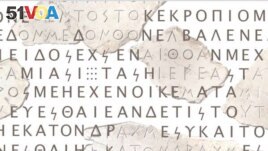16 March 2022
Researchers have developed an artificial intelligence (AI) system to help fill in missing words in ancient writings.
The system is designed to help historians restore the writings and identify when and where they were written.
Many ancient populations used writings, also known as inscriptions, to document different parts of their lives. The inscriptions have been found on materials such as rock, ceramic and metal. The writings often contained valuable information about how ancient people lived and how they structured their societies.

This image of an ancient Greek text represents a restoration by the Ithaca tool, developed by Alphabet's DeepMind, with researchers from the University of Oxford, Ca' Foscari University of Venice and Athens University of Economics (Image Credit: Ca' Foscari University of Venice).
But in many cases, the objects containing such inscriptions have been damaged over the centuries. This left major parts of the inscriptions missing and difficult to identify and understand.
In addition, many of the inscribed objects were moved from areas where they were first created. This makes it difficult for scientists to discover when and where the writings were made.
The new AI-based method serves as a technological tool to help researchers repair missing inscriptions and estimate the true origins of the records.
The researchers, led by Alphabet's AI company DeepMind, call their tool Ithaca. In a statement, the researchers said the system is "the first deep neural network that can restore the missing text of damaged inscriptions." A neural network is a machine learning computer system built to act like the human brain.
The findings were recently reported in a study in the publication Nature. Researchers from other organizations – including the University of Oxford, Ca' Foscari University of Venice and Athens University of Economics and Business – also took part in the study.
The team said it trained Ithaca on the largest collection of data containing Greek inscriptions from the non-profit Packard Humanities Institute in California. Feeding this data into the system is designed to help the tool use past writings to predict missing letters and words in damaged inscriptions.
The researchers reported that in experiments with damaged writings, Ithaca was able to correctly predict missing inscription elements 62 percent of the time. In addition, the tool was 71 percent correct in identifying where the inscriptions first came from. And, the system was able to effectively date writings to within 30 years, the team said.
Yannis Assael is a research scientist with DeepMind who helped lead the study. He said in a statement that Ithaca was designed to "support historians to expand and deepen our understanding of ancient history."
When historians work on their own, the success rate for restoring damaged inscriptions is about 25 percent. But when humans teamed up with Ithaca to assist in their work, the success rate jumped to 72 percent, Assael said.
Thea Sommerschield was another lead researcher on the project. She is the Marie Curie Fellow at Ca' Foscari University of Venice. Sommerschield said she hopes systems like Ithaca "can unlock the cooperative potential" between AI and humans in future restoration work involving important ancient inscriptions.
She said the system had already provided new information to help researchers reexamine important periods in Greek history.
In one case, Ithaca confirmed new evidence presented by historians about the dating of a series of important Greek decrees. The decrees were first thought to have been written before 446/445 BCE. But the new evidence suggested a date in the 420s BCE. Ithaca predicted a date of 421 BCE.
Sommerschield said that the date change may seem small. But it has "significant implications for our understanding of the political history of Classical Athens," she added.
The team is currently working on other versions of Ithaca trained on other ancient languages. DeepMind has launched a free, interactive tool based on the system for use by researchers, educators, museum workers and the public.
I'm Bryan Lynn.
Bryan Lynn wrote this story for VOA Learning English, based on reports from DeepMind, the University of Oxford, the University of Venice and Nature.
We want to hear from you. Write to us in the Comments section, and visit 51VOA.COM.
_______________________________________________________
Words in This Story
artificial intelligence (AI) – n. the development of computer systems with the ability to perform work that normally requires human intelligence
restore – v. to make something good exist again
ceramic – n. objects made by shaping and heating clay
society – n. a large group of people who live in the same country and share the same laws, traditions, etc.
origins – n. the cause of something or where something comes from
potential – n. a possibility when the necessary conditions exist
decree – n. an official order for something
significant – adj. important or noticeable
implication – n. a result or effect